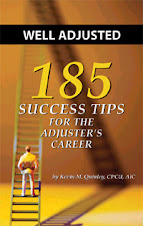Sunday, April 29, 2012
Does the Claims World Favor Extroverts?
I just finished reading a recently published book, Quiet: The Power of Introverts in a World that Can’t Stop Talking by Susan Cain. She makes the point that most of the world puts a higher value on extroversion and that subtle or not so subtle pressures exist to handicap quieter types.
Cain’s book prompted me to wonder if the claims profession follows this mold. Does the claims world favor extroverts? Can an introvert survive, or even thrive, in the world of claims?
This transition hit me in the face like a wet towel when I entered the claims world. I attended my grad school commencement ceremony on a Saturday afternoon. On Sunday morning, I flew to Atlanta to attend Crawford & Company’s five-week adjuster boot camp. As a grad student, I had lived a bookish existence.
The last four months in grad school, I spent writing out a 200-page Masters thesis on comparative political theory. (Subsequently read only by my mother and some chronic insomniacs seeking a cure …) After graduation, armed with a freshly minted M.A. in Government, I plummeted into the claims world. I was dealing first-hand with people from all socio-economic strata. Most of them were stressed out by their loss and wary of this new kid who showed to adjust their claim. I got yelled at, chewed out, questioned and second-guessed.
And those were the nice ones …
Handling claims wasn’t anything like grad school. In the halls of academia, introversion served you just fine.
In the claims world, shrinking violets get stomped on. I realized that, if I was going to make claims a career, some adjustment (no pun intended) was needed.
So, the questions remain. How do introverts grab their “air time” and advance their careers? Can introverts put on a persona of extroversion in order to advance their claims career?
I don’t claim to have the answers, though I can hazard a few theories.
Much of what adjusters do relies on traits we commonly associate with extroversion. Forcing yourself to deal with people who have suffered loss is no role for shrinking violets. You need not only the hide of a rhinoceros but also the self-assertiveness to jump into situations that most people would avoid. Selling a settlement figure to a reluctant claimant or policyholder, entering the rough and tumble of a settlement negotiation with claimant’s counsel, presenting the second-quarter claim results to upper management – these roles call upon the extrovert.
On the other hand, there are adjuster roles that require quieter, more reflective approaches. These include traits we more often associate with introverts. Examples include:
•
Thoughtfully analyzing a packet of demand documentation to fine tune a reserve and develop a target settlement figure
•
Conduct a thoughtful performance review of claim staff
•
Listening empathetically to an employee, a claimant or insured who has gone through a traumatic event
In some settings, the claims professional is better off closing the mouth, opening the ears and being on “receive” mode. In other roles and settings, the adjuster will be more effective assuming a take-charge, vocal and assertive approach.
One key to job and career success is to size up which approach works best in different situations. Possessing this situational awareness can separate average adjusters from the extraordinary. I’m not saying it’s easy, but it is doable.
So … what is your take? Is there room in the claims business for introverts? Is being an extrovert ever a liability when performing claims work? For those at one end of the spectrum of extroversion or introversion, do you think it’s possible to re-mold your traits to adapt to job demands and situations?
Please share your thoughts here or reply to claimscoach@gmail.com
Subscribe to:
Post Comments (Atom)






No comments:
Post a Comment